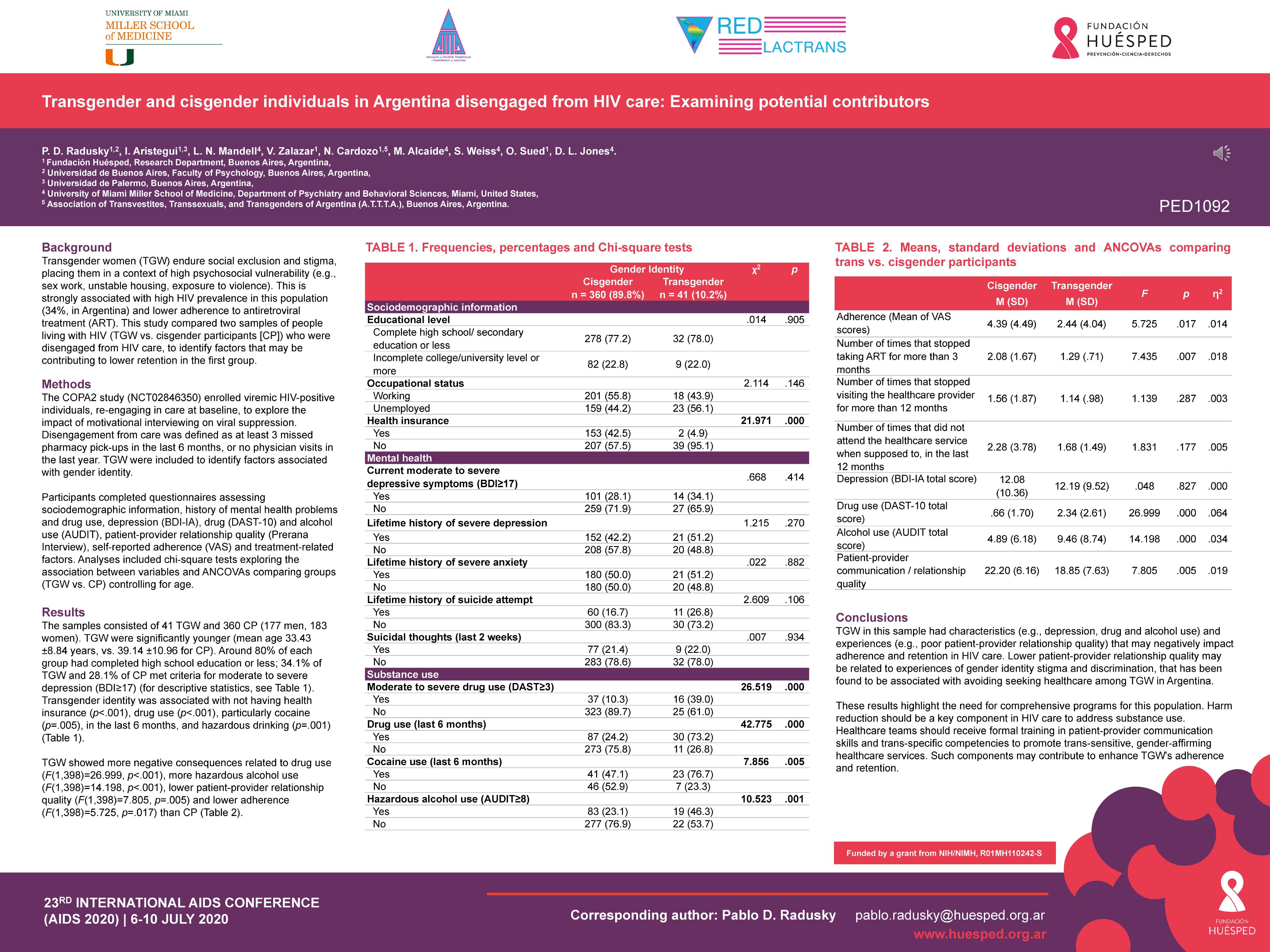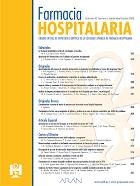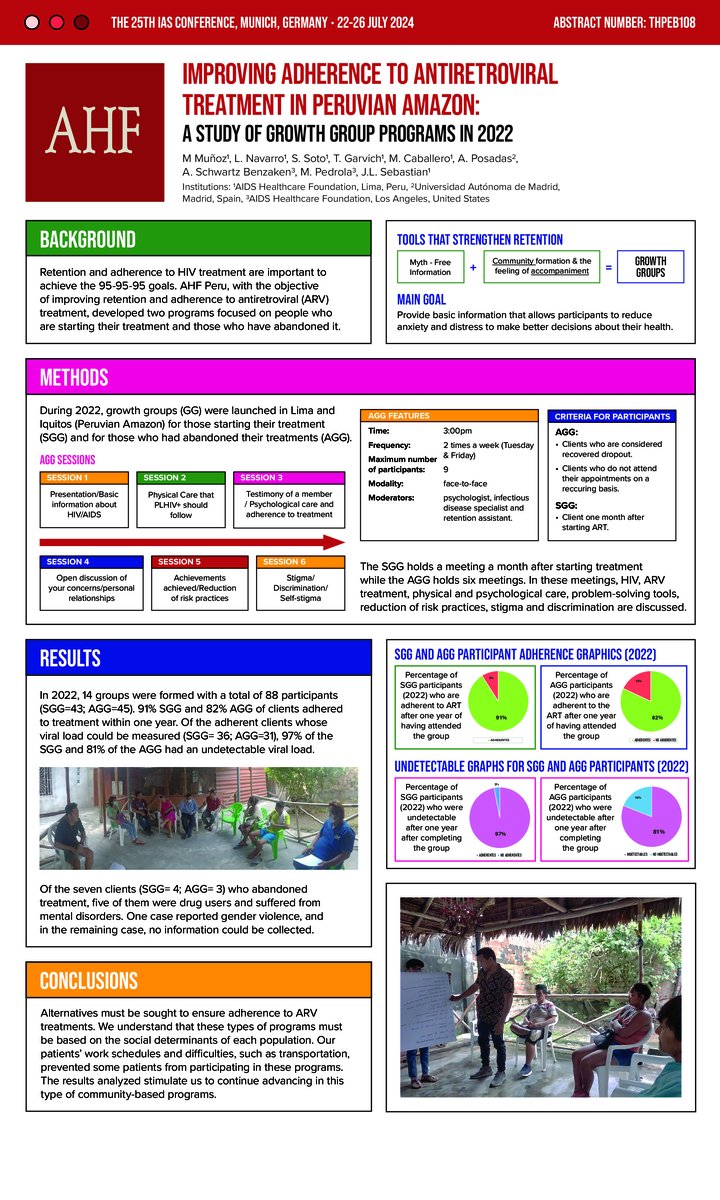Catàleg general VIH/sida

Transgender and cisgender individuals in Argentina disengaged from HIV care: examining potential contributors
Resum
BACKGROUND: Transgender women (TGW) endure social exclusion and stigma, placing them in a context of high psychosocial vulnerability (sex work, unstable housing, exposure to violence, etc.). This is strongly associated with high HIV prevalence in this population (34%, in Argentina) and lower adherence to antiretroviral treatment (ART). This study compared two samples of people living with HIV (TGW vs. cisgender participants [CP]) who were disengaged from HIV care. METHODS: The COPA2 study (NCT02846350) enrolled viremic HIV-positive individuals, re-engaging in care at baseline, to explore the impact of motivational interviewing on viral suppression. Disengagement from care was defined as at least 3 missed pharmacy pick-ups in the last 6 months, or no physician visits in the last year. TGW were included to identify factors associated with gender identity. Participants completed questionnaires assessing sociodemographic information, depression (BDI-IA), drug (DAST-10) and alcohol use (AUDIT), patient-provider relationship quality, adherence (VAS) and treatment-related factors. Analyses included chi-square tests exploring the association between variables and ANCOVAs comparing groups controlling for age. RESULTS: The samples consisted of 41 TGW and 360 CP (177 male, 183 female). TGW were significantly younger (mean age 33.43 ±8.84 years, vs. 39.14 ±10.96 for CP). Around 80% of each group had completed high school education or less; 34.1% of TGW and 28.1% of CP met criteria for moderate to severe depression (BDI'¥17). Transgender identity was associated with not having health insurance (p<.001), use of drugs (p<.001), particularly cocaine (p=.005), in the last 6 months, and hazardous drinking (p=.001). TGW showed more negative consequences related to drug use (F(1,398)=26.999, p<.001), more hazardous alcohol use (F(1,398)=14.198, p<.001), lower patient-provider relationship quality (F(1,398)=7.805, p=.005) and lower adherence (F(1,398)=5.725, p=.017) than CP. No other significant differences were identified. CONCLUSIONS: TGW in this sample had characteristics (e.g., depression, drug and alcohol use) and experiences (e.g., poor patient-provider relationship quality) that may negatively impact adherence and retention in care, highlighting the need for comprehensive programs for this population. Harm reduction should be a key component in HIV care to address substance use. Healthcare teams should receive formal training in patient-provider communication skills and trans-specific competencies to enhance TGW''s adherence and retention.
Autoria:
RADUSKY, Pablo David; ARISTEGUI, Inés; MANDELL, Lissa N.; ZALAZAR, Virginia; CARDOZO, Nadir F.; ALCAIDE, Maria L.; WEISS, Stephen M.; SUED, Omar; JONES, Deborah L.
Autoria institucional: University of Miami. Miller School of Medicine; ATTTA (Asociación de Travestis, Transexuales y Transgéneros de Argentina); REDLACTRANS (Red Latinoamericana y de Caribe de Personas Trans); Fundación Huésped (Argentina)
Autoria institucional: University of Miami. Miller School of Medicine; ATTTA (Asociación de Travestis, Transexuales y Transgéneros de Argentina); REDLACTRANS (Red Latinoamericana y de Caribe de Personas Trans); Fundación Huésped (Argentina)
Fitxa bibliogràfica
- Any de publicació:
- 2020
- Descripció física:
- [1] p.
- Format:
- Fulletó
- Tipus de document:
- Col·loquis i ponències
- Notes:
- Póster presentado en la 23rd International AIDS Conference, celebrada de manera virtual del 6 al 10 de julio de 2020.





